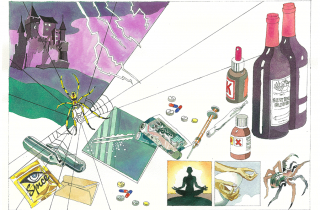Research
- Attend open meetings of NA and AA (the 12 Step support meetings for those addicted to alcohol or drugs) so you can understand and empathise with the experience of your addicted child. You’ll also find out how people in these fellowships support and ‘sponsor’ each other to achieve sobriety and staying clean. I’ve attended one open NA meeting (I plan to attend more in future) and I was humbled by everything I heard from the people at the meeting.
- If re-hab is not an option, or there’s a long waiting list for your community re-hab, then these 12 Step meetings will provide enormous support for your Addict. If you have been to an open NA or AA meeting,and witnessed the wonderful support flowing to people there, you’ll be able talk about that with your son and encourage him to go to meetings himself.
- Research community re-habs in your area
- If you are able to pay or have the requisite insurance, look into private re-habs
- Get hold of a timetable from a re-hab. Look at the activities, talking therapies and self-examination that people undergo in re-hab. Ask yourself if you feel that you would be able to handle that for 6 weeks (and that’s a minimum). No picnic, right? Glad you agree, because – I won’t lie to you – the catch in all this is that you’ll need to attend courses for relatives at the re-hab. Why? Because if you don’t, your Addict’s chances of recovery are hugely diminished. Remember – Addiction is a family illness.
12 Step meetings or re-hab?
You will need to plan carefully.
Discuss between you whether attending frequent NA/AA meetings is the best way forward for your son – or whether re-hab is preferable.
If your son’s slide into Addiction hasn’t gone too far, it may be you are able to discuss with him the wonderful support and encouragement that he can find through attending the 12 Step meetings. If he agrees, and goes willingly, that’s a really good start.
Many people have achieved sobriety by regular attendance at AA/NA (sometimes as often as one or more meetings a day) over the years. For many people, re-hab has not been an option, for whatever reason.
But if your son has reached a stage in his Addiction where some 24/7 help is needed, then re-hab is the best course.
Re-hab is a way of turbo-charging the initial stages of recovery from alcohol and substance addiction. It can be immensely tough and many people will go through re-hab more than once (yep – even those who aren’t celebrities).
Note: If your son goes to re-hab, he will be introduced to the 12 Steps there. They will tell him that when he leaves re-hab, he absolutely must attend NA/AA regularly (probably at least 2/3 times a week). That’s because re-hab is not a magic bullet. The work done there is just a start. Progress can only be maintained by attending NA/AA meetings. It’s like taking regular exercise to stay healthy.
But how do we persuade our Addict to go to re-hab?
You gather your courage and have the Conversation with your son or daughter about going into re-hab.
It has been said many a time that an Addict must hit rock-bottom before they will go into re-hab. Bollocks to that. If we had allowed that to happen to our son, he’d be dead by now. No question.
Of course, it’s not too often that an Addict goes quietly into re-hab with no resistance. So this is where your Team comes in. (Refer back to Preparation, Find Support and Gather Your Team). For you, the Parents, to do this on your own is likely to end in high emotion, anger and failure to move things forward. So you may want to appoint one of your Team (a close relative or family friend) to lead this Conversation. You can decide in advance what sanctions you can use if your son still refuses to go to re-hab after you and your team have had this Conversation with him.
What I have just described is often referred to as an Intervention. If you know you are up against a very difficult Addict, who has a severe addiction, or one who is prone to violence, then I urge you NOT to do this without professional help. Even a trusted uncle or family friend will not have the skills necessary to cope with an adverse reaction from this type of Addict.
Intervention is a big topic of its own, which I will take a look at in future posts. In those posts, I will invite experts in this field to explain how a professional Intervention is carried out, complete with sanctions to be applied if your son refuses to go into re-hab.
I think we need a sort of decision-tree for all this. I’ll work on that and keep you posted…
The next post in this series is Making a Quick Start







